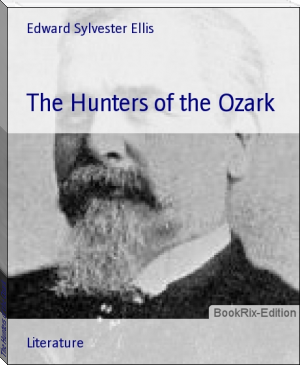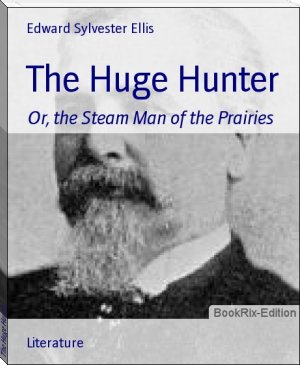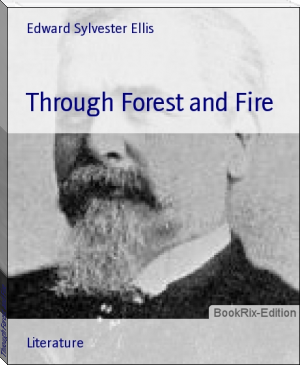The Hunters of the Ozark - Edward Sylvester Ellis (children's ebooks online .txt) 📗

- Author: Edward Sylvester Ellis
Book online «The Hunters of the Ozark - Edward Sylvester Ellis (children's ebooks online .txt) 📗». Author Edward Sylvester Ellis
were directed.
The two Winnebagos spent only a minute or so in scanning the surrounding country, when they began gathering wood, until they had quite a pile. A quantity of leaves, some of which were damp, was mixed among the twigs, so that when with a little trouble they were fired by means of the flint and steel in the hands of one of the red men, the fuel did not burn clearly but gave off considerable dark smoke, which was what the Winnebagos wanted.
As soon as the fire was fairly burning, one of the Indians flung his blanket over it, his friend seizing the other part, while both held it thus until it was in danger of taking fire or smothering the flames. Had the coarse cloth been a little more cleanly it is likely that it would have been burned, but as it was it strangled the blaze until it may be said there were several bushels of smoke gathered beneath and the embers were at their last gasp.
At that moment, the Indians raised the blanket so that they stood upright, and plenty of fresh air was allowed to feed the blaze. Then they slowly waved the blanket between them, sometimes lowering it until it was scorched by the sleepy flames, and then elevating it above their heads. All the time, they manipulated the blanket, sometimes straight up and down, sometimes diagonally, and indeed, in every possible way.
The result of all this varied swinging was that the black column of vapor which slowly climbed the sky, was broken into circles, spiral curves, and all sorts of odd-shaped figures, which did not dissolve for several minutes in the clear air above.
I need not tell you what this meant, for in another place I have described the same thing. It was a signal fire intended by the Winnebagos for the eyes of a party of friends who were too far off to be reached in any other way. Deerfoot had seen such telegraphy many a time and oft, and more than once he had used it. He could interpret such a signal when made by a Shawanoe, Wyandotte, Sauk or Fox, but he had never learned the code in use by the Winnebago military authorities.
However, it was not possible that there was any very fine shade of meaning in the various manipulations of the two warriors. Keen brained as is the American Indian, he is unable to do a great many things with which he is credited: one of these is to do more than telegraph the simplest messages by means of fire, though it is beyond question that important tidings has been flashed hundreds of miles in a single night, from mountain top to mountain top, by means of the signal fires of the Indians.
What disturbed Deerfoot was this proof that there was a second party of Winnebagos in that section of the country. He had not dreamed of such a thing, and it might well cause him alarm, that is, for the three men who were so intent on gathering their furs comparatively a short distance away.
Carefully screening himself from observation, the Shawanoe looked intently in the direction of the gaze of the Winnebagos. He saw that they were not peering at any other ridge, but at the broad low valley to the north-west. They had not long to look when they detected a thin bluish column of smoke creeping upward among the tree tops and dissolving in the clear air above.
Deerfoot also saw it, and he knew that it was a reply to the first signal. There was another party of Winnebagos in the neighborhood; they would soon join Black Bear's party, and there was no time for delay. Indeed, but for the discovery he had made, the Shawanoe would have felt that he had tarried too long already.
It was not far now to the camp of the Hunters of the Ozark, and it was perilous to wait to warn them. Every hour counted. Not only that, but, as you can readily see, Fred Linden and Terry Clark were in still greater danger.
CHAPTER XXVI
ON THE EDGE OF THE PRAIRIE.
The night was far advanced when Fred Linden and Terry Clark reached the stream, where the former remarked that their progress was stopped. Of course he meant that they could continue if they chose to make another raft or they could wade, but they had journeyed so far since dusk, and the trouble of constructing a float was such that he thought it best to wait where they were until daylight. They were pretty well fagged out, and nothing could have been more grateful than to throw themselves on the ground and sleep for several hours.
Terry was as tired as his companion, but he stood irresolute, inclined to think it best that they should push on.
"The stream doesn't look very deep," said he, "and if ye agraas wid me that we can wade, it'll be wiser if we make tother side and then journey to the nixt straam."
"But that may be a good many miles further on."
"Thin all we have to do is to travel a good many miles," said the plucky Irish lad, sitting down to take off his shoes.
"I shall never give in to _you_," remarked Fred, also seating himself and beginning to remove his foot-gear.
Before any thing more could be done, however, both were startled by the discovery that some one was on the other side of the stream. First they heard the guttural exclamations which they knew were made by Indians, and then they saw one of the red men come out into full view in the moonlight.
Without a word, the boys hastily moved back under the shadow of the trees, making sure that they also placed several rods between them and the trail which they had followed to the edge of the water. Secure from observation, they fastened their eyes on the other bank, where they saw an interesting sight.
Three Indian warriors stood for fully five minutes in plain sight, while they discussed the same question that had engaged the lads--that is, in what manner the stream should be crossed.
It did not take them long to decide. The foremost stepped into the water, followed by the other two, none removing his moccasins or leg-gear, and in a brief while they came out upon dry land again, within fifty feet of where the lads were crouching under shelter.
The boys trembled as they realized how narrow their escape had been. Had they not paused for a few minutes, they would have been in the middle of the stream, just as the others came down to the edge of the water. In the light of their recent experience with the Winnebagos, they had not a particle of doubt that the three belonged to the same tribe and that they were fierce enemies. Had they not slain the boys, they would have made captives of both and conducted them to the main party. Then when it should have been found that one of the prisoners had the gun that once belonged to the Wolf, their fate would have been sealed.
The incident drove from the mind of Fred all wish to tarry on the road. He wished that they were many miles on their way to the camp in the Ozarks. They considered themselves members of the little party of hunters whom they could not reach any too soon.
"I obsarved while the spalpeens were wadin'," said Terry, "that none of them wint lower in the water than their knees. Why didn't they take off their shoes like dacent gintlemen, and cross as they should; but bein' as they didn't do the same, why, we'll sit them the example."
A minute later, the boys stepped into the stream, and, by using care, reached the other side, with all their garments dry. Their shoes were quickly replaced, and the two were off again, so moved by what they had seen, that for the time they forgot fatigue and every thing else.
"I tell you, Terry, that matters are beginning to look worse than even Deerfoot thought, and you know that when he left us he didn't feel satisfied, by any means."
"Could it be," asked his companion, "that these spalpeens don't belong to the same crowd that we saw?"
"I am quite sure they do; these three would not have been so separated from the others."
"Where could they have come from?" asked the puzzled Terry.
"Where all the Indians come from--the woods. I suppose a large party of Winnebagos have been off on a tramp, and they are coming together with a view of going home or of making an attack on some place or persons."
A random guess, like this, sometimes comes closer to the truth than a labored theory. The three Indians whom they had so narrowly escaped were members of Black Bear's party and were on their way to meet him. Furthermore, there were more of them at no great distance.
"Me father lost his life by the Indians," said Terry, in a soft voice; "but though it was not known what tribe the same belonged to, I don't think they were Winnebagos; but Indians are Indians and are always ready to kill white people whiniver the chance comes along."
"You are right; father doesn't think there is the least danger or he wouldn't have sent for me. He has hunted several seasons without any trouble with them, but he ought to have learned long ago to be forever on the watch."
"Fred," said the other, stopping short in his excitement; "do ye think they are goin' to attack the _sittlement_?"
"Impossible! There's the blockhouse and plenty of men to defend it against a thousand savages."
"But the woods saam to be full of thim; there may be some kind of an Indian war that has broke out and these are the first part of the rid army that is to coom down and swaap us over the Rocky Mountains."
But Fred could not share in this prodigious fear. He faced to the front again and laughed, as he resumed his walk.
"There couldn't be any thing like _that_ without warning reaching us; some of the runners would have come to Greville with the news; besides, Deerfoot would have been certain to know something about it."
"_That_ sittles it!" exclaimed Terry, with a sigh of relief; "ye are right in sayin' the Shawanoe would have knowed about it; he would have larned it before the spalpeens that started out on the war path, and, bein' as he didn't say any thin', I'm sure ye are right; but all the same, it looks bad for the Hunters of the Ozark, which maans oursilves as well as the men in the mountains."
"There's no use of denying that there is enough to make all of us anxious, but when I remember that father and Mr. Hardin and Bowlby have spent so many years in the Indian country, I can not help feeling hope that they will be able to take care of themselves. You know they are all good shots and they have a cabin strong enough to stand a rough siege."
"I don't forgit the same; but there's a good many more rid than white men and Mr. Bowlby is lame."
"What of that? He doesn't expect to fight with his feet."
"There are many scrimmages in which it's handy to use yer faat. If Deerfut hadn't popped along just as I keeled over the Wolf I'd jumped on
The two Winnebagos spent only a minute or so in scanning the surrounding country, when they began gathering wood, until they had quite a pile. A quantity of leaves, some of which were damp, was mixed among the twigs, so that when with a little trouble they were fired by means of the flint and steel in the hands of one of the red men, the fuel did not burn clearly but gave off considerable dark smoke, which was what the Winnebagos wanted.
As soon as the fire was fairly burning, one of the Indians flung his blanket over it, his friend seizing the other part, while both held it thus until it was in danger of taking fire or smothering the flames. Had the coarse cloth been a little more cleanly it is likely that it would have been burned, but as it was it strangled the blaze until it may be said there were several bushels of smoke gathered beneath and the embers were at their last gasp.
At that moment, the Indians raised the blanket so that they stood upright, and plenty of fresh air was allowed to feed the blaze. Then they slowly waved the blanket between them, sometimes lowering it until it was scorched by the sleepy flames, and then elevating it above their heads. All the time, they manipulated the blanket, sometimes straight up and down, sometimes diagonally, and indeed, in every possible way.
The result of all this varied swinging was that the black column of vapor which slowly climbed the sky, was broken into circles, spiral curves, and all sorts of odd-shaped figures, which did not dissolve for several minutes in the clear air above.
I need not tell you what this meant, for in another place I have described the same thing. It was a signal fire intended by the Winnebagos for the eyes of a party of friends who were too far off to be reached in any other way. Deerfoot had seen such telegraphy many a time and oft, and more than once he had used it. He could interpret such a signal when made by a Shawanoe, Wyandotte, Sauk or Fox, but he had never learned the code in use by the Winnebago military authorities.
However, it was not possible that there was any very fine shade of meaning in the various manipulations of the two warriors. Keen brained as is the American Indian, he is unable to do a great many things with which he is credited: one of these is to do more than telegraph the simplest messages by means of fire, though it is beyond question that important tidings has been flashed hundreds of miles in a single night, from mountain top to mountain top, by means of the signal fires of the Indians.
What disturbed Deerfoot was this proof that there was a second party of Winnebagos in that section of the country. He had not dreamed of such a thing, and it might well cause him alarm, that is, for the three men who were so intent on gathering their furs comparatively a short distance away.
Carefully screening himself from observation, the Shawanoe looked intently in the direction of the gaze of the Winnebagos. He saw that they were not peering at any other ridge, but at the broad low valley to the north-west. They had not long to look when they detected a thin bluish column of smoke creeping upward among the tree tops and dissolving in the clear air above.
Deerfoot also saw it, and he knew that it was a reply to the first signal. There was another party of Winnebagos in the neighborhood; they would soon join Black Bear's party, and there was no time for delay. Indeed, but for the discovery he had made, the Shawanoe would have felt that he had tarried too long already.
It was not far now to the camp of the Hunters of the Ozark, and it was perilous to wait to warn them. Every hour counted. Not only that, but, as you can readily see, Fred Linden and Terry Clark were in still greater danger.
CHAPTER XXVI
ON THE EDGE OF THE PRAIRIE.
The night was far advanced when Fred Linden and Terry Clark reached the stream, where the former remarked that their progress was stopped. Of course he meant that they could continue if they chose to make another raft or they could wade, but they had journeyed so far since dusk, and the trouble of constructing a float was such that he thought it best to wait where they were until daylight. They were pretty well fagged out, and nothing could have been more grateful than to throw themselves on the ground and sleep for several hours.
Terry was as tired as his companion, but he stood irresolute, inclined to think it best that they should push on.
"The stream doesn't look very deep," said he, "and if ye agraas wid me that we can wade, it'll be wiser if we make tother side and then journey to the nixt straam."
"But that may be a good many miles further on."
"Thin all we have to do is to travel a good many miles," said the plucky Irish lad, sitting down to take off his shoes.
"I shall never give in to _you_," remarked Fred, also seating himself and beginning to remove his foot-gear.
Before any thing more could be done, however, both were startled by the discovery that some one was on the other side of the stream. First they heard the guttural exclamations which they knew were made by Indians, and then they saw one of the red men come out into full view in the moonlight.
Without a word, the boys hastily moved back under the shadow of the trees, making sure that they also placed several rods between them and the trail which they had followed to the edge of the water. Secure from observation, they fastened their eyes on the other bank, where they saw an interesting sight.
Three Indian warriors stood for fully five minutes in plain sight, while they discussed the same question that had engaged the lads--that is, in what manner the stream should be crossed.
It did not take them long to decide. The foremost stepped into the water, followed by the other two, none removing his moccasins or leg-gear, and in a brief while they came out upon dry land again, within fifty feet of where the lads were crouching under shelter.
The boys trembled as they realized how narrow their escape had been. Had they not paused for a few minutes, they would have been in the middle of the stream, just as the others came down to the edge of the water. In the light of their recent experience with the Winnebagos, they had not a particle of doubt that the three belonged to the same tribe and that they were fierce enemies. Had they not slain the boys, they would have made captives of both and conducted them to the main party. Then when it should have been found that one of the prisoners had the gun that once belonged to the Wolf, their fate would have been sealed.
The incident drove from the mind of Fred all wish to tarry on the road. He wished that they were many miles on their way to the camp in the Ozarks. They considered themselves members of the little party of hunters whom they could not reach any too soon.
"I obsarved while the spalpeens were wadin'," said Terry, "that none of them wint lower in the water than their knees. Why didn't they take off their shoes like dacent gintlemen, and cross as they should; but bein' as they didn't do the same, why, we'll sit them the example."
A minute later, the boys stepped into the stream, and, by using care, reached the other side, with all their garments dry. Their shoes were quickly replaced, and the two were off again, so moved by what they had seen, that for the time they forgot fatigue and every thing else.
"I tell you, Terry, that matters are beginning to look worse than even Deerfoot thought, and you know that when he left us he didn't feel satisfied, by any means."
"Could it be," asked his companion, "that these spalpeens don't belong to the same crowd that we saw?"
"I am quite sure they do; these three would not have been so separated from the others."
"Where could they have come from?" asked the puzzled Terry.
"Where all the Indians come from--the woods. I suppose a large party of Winnebagos have been off on a tramp, and they are coming together with a view of going home or of making an attack on some place or persons."
A random guess, like this, sometimes comes closer to the truth than a labored theory. The three Indians whom they had so narrowly escaped were members of Black Bear's party and were on their way to meet him. Furthermore, there were more of them at no great distance.
"Me father lost his life by the Indians," said Terry, in a soft voice; "but though it was not known what tribe the same belonged to, I don't think they were Winnebagos; but Indians are Indians and are always ready to kill white people whiniver the chance comes along."
"You are right; father doesn't think there is the least danger or he wouldn't have sent for me. He has hunted several seasons without any trouble with them, but he ought to have learned long ago to be forever on the watch."
"Fred," said the other, stopping short in his excitement; "do ye think they are goin' to attack the _sittlement_?"
"Impossible! There's the blockhouse and plenty of men to defend it against a thousand savages."
"But the woods saam to be full of thim; there may be some kind of an Indian war that has broke out and these are the first part of the rid army that is to coom down and swaap us over the Rocky Mountains."
But Fred could not share in this prodigious fear. He faced to the front again and laughed, as he resumed his walk.
"There couldn't be any thing like _that_ without warning reaching us; some of the runners would have come to Greville with the news; besides, Deerfoot would have been certain to know something about it."
"_That_ sittles it!" exclaimed Terry, with a sigh of relief; "ye are right in sayin' the Shawanoe would have knowed about it; he would have larned it before the spalpeens that started out on the war path, and, bein' as he didn't say any thin', I'm sure ye are right; but all the same, it looks bad for the Hunters of the Ozark, which maans oursilves as well as the men in the mountains."
"There's no use of denying that there is enough to make all of us anxious, but when I remember that father and Mr. Hardin and Bowlby have spent so many years in the Indian country, I can not help feeling hope that they will be able to take care of themselves. You know they are all good shots and they have a cabin strong enough to stand a rough siege."
"I don't forgit the same; but there's a good many more rid than white men and Mr. Bowlby is lame."
"What of that? He doesn't expect to fight with his feet."
"There are many scrimmages in which it's handy to use yer faat. If Deerfut hadn't popped along just as I keeled over the Wolf I'd jumped on
Free e-book «The Hunters of the Ozark - Edward Sylvester Ellis (children's ebooks online .txt) 📗» - read online now
Similar e-books:





Comments (0)